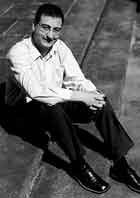

 |
 |
|
|
Kalitzke & Widmann and Donaueschinger 2006
A batch of new music from Coda Distribution Ltd has given us an opportunity to catch up with international modernists, some of them getting older... The first two of these newly available CDs (illustrated above) may serve as starter examples of what is going on at the purported "cutting edge" in Germany. I listened to them all over a few days in which I was also enjoying Rzewski's polemics about the "establishment" avant garde as represented by e.g. Darmstadt and Donaueschinger, doomed, as he believes, for its "deplorable situation of isolation and elitism with which contemporary music has been cursed throughout this century; a situation, furthermore, that has grown steadily worse" (Frederic Rzewski Nonsequiturs (2007), p. 220 (1978) etc. An essential read... Has the cutting edge become a little blunted? We enjoyed Johannes Kalitzke's six pieces for string quartet (musical interpretations of the setting sun) as accessible, abstract music, but could make nothing of the verbiage in the extensive notes and interview with the composer which grace the booklet. I look forward to hearing them again but less so his orchestral works chosen, which purport to be "over-paintings" of Brahms' Four Serious Songs, "superscription, concealment, made into an aspect of variation"; the connections inaudible to our ears [Kairos KAI0012702]. In one of several SWR recordings from the 2006 Donaueschinger Music Days received, the Haas work for programmed lights (instead of a conductor) to "inexorably guide four orchestral groups located along four walls of he room" cannot reasonably be expected to work on CD and we could make nothing of it. In the same disc, Jorg Widmann's name caught my eye. He is a virtuoso clarinettist also and we had enjoyed and recommended a CD of his cello concerto. His Labyrinth 2 "spoke" to us with its lively instrumentation, a recomposition derived from the material of an earlier Labyrinth for 48 strings. Exciting unpredictable listening [NEOS 10725]. Yes, I'll continue to look out for Widmann. More of the weird and wonderful offerings from Donaueschinger 2006 follow... The ubiquitous Arditti Quartet [NEOS 10724], invariably present at these new music events, gives us a Norwegian piece for string quartet + solo violin (which might usefully be programmed with Chausson's Concert - except that you'd scarcely know that stringed instruments were being deployed or these "micropolyphoniccells of coloured noise". Forget that one. Rihm "defamiliarises the timbre" for two studies with soprano (Claron McFadden). In the first (muted througout) she is confined to wordless vocalising in the low mezzo range, before being freed to fly high singing Blake about Phaeton's fall. Julio Estrada composes singing in his head, and here is allowed to do so, in a way, with the quartet.
Far more engaging than all these esoteric offerings is the Jordanian Saed Haddad who embraces the "otherness" of a Christian Arab who has become a western contemporary composer. Delighful music and I cannot resist listing the movement titles of his Joie voilée (2005/2006) : Prologue: On Purity. On Happiness. On Warmth. On Moderateness. On Serenity. On Collectiveness. On Togetherness. On the Individual. On Others. On Peace. On Struggle. On Despair. On Death. Epilogue. these "micropolyphoniccells of coloured noise". Forget that one. Rihm "defamiliarises the timbre" for two studies with soprano (Claron McFadden). In the first (muted througout) she is confined to wordless vocalising in the low mezzo range, before being freed to fly high singing Blake about Phaeton's fall. Julio Estrada composes singing in his head, and here is allowed to do so, in a way, with the quartet.
Far more engaging than all these esoteric offerings is the Jordanian Saed Haddad who embraces the "otherness" of a Christian Arab who has become a western contemporary composer. Delighful music and I cannot resist listing the movement titles of his Joie voilée (2005/2006) : Prologue: On Purity. On Happiness. On Warmth. On Moderateness. On Serenity. On Collectiveness. On Togetherness. On the Individual. On Others. On Peace. On Struggle. On Despair. On Death. Epilogue.The senior Argentinian joker Mauricio Kagel's Farce for ensemble sounds old-hat and the antics desperately needs to be seen; they fall very flat on audio alone, and I was disappointed too by Alberto Posadas' Anamorfosis, which is well described by its title [NEOS 10727]. And for a CD as a whole, the Nigerian born Charles Uzor's Quartets & To finish this overview, Wolfgang Mitterer's music for baroque orchestra, electric harpsichord, turntable and electronics with overlays and distortions upon Telemann's Water Music has a novelty attraction and we enjoyed hearing it. It is coupled with Semplice by Martin Smolka (pictured) for old and new instruments, peacefully endearing and euphonious music for most of its six deceptively simple movements; it does unexpectedly get rather wild in the penultimate one before settling down to a peaceful finish. Both these composers supply notes which are brief and succinct; always a good sign... [NEOS 10726] Peter Grahame Woolf
|